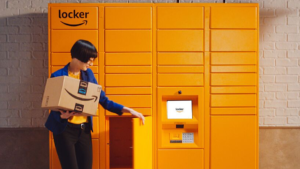It could be the spirit of Christmas yet to come. A populace feeling increasingly guilty about the road congestion and street pollution caused by their online shopping habit begin to decline to choose the home delivery option.
However, at the same time they can’t quite face the click and collect queue at the local post office or corner shop or other “pudo” point where people do their pick-up-drop-off.
The alternative solution — and a Polish billionaire is prepared to put up hundreds of millions of pounds of his shareholders’ money testing it — is the parcel locker: millions of the little boxes across tens of thousands of locations providing greener, cheaper and less guilt-inducing parcel delivery.
On the current front cover of the Polish edition of Forbes magazine, Rafal Brzoska, 43, has become a celebrity businessman in his native country, where as the founder and boss of the delivery box operator InPost, he is known as the Locker King.
Smart lockers which allow customers to open the boxes by digital keypads or via an app on their phone have become the default parcel delivery method in Poland, a success which enabled Brzoska to float InPost on the Amsterdam stock exchange earlier this year where it is valued at €6.5 billion.
With Deutsche Post-owned DHL and the American leviathan Amazon in trench warfare in the German locker market, Brzoska is planning to crack Europe’s next largest economy: Britain.
The UK is getting back to the workplace after the pandemic and Brzoska believes lockers are the e-commerce future for a country back on the move.
“The UK is ready for adoption. We are investing and creating the market,” he said during a visit to the City last week. “We would not now be in the UK without first the success and the learning from setbacks in Poland.”
But why to date hasn’t the UK embraced a parcel delivery channel that, after all, has been around for decades?
“There have been no players who have had the conviction that it would work or the conviction to make it work,” Brzoska said.
InPost is taking on Amazon which has already installed boxes in about 5,000 locations in the UK while the giants of the domestic market Royal Mail and the Post Office and multinational rivals UPS, DHL and DPD have stood back.
Brzoska plans to overtake Amazon sooner rather than later: “We are putting in 2,000 locations by the end of 2021. That will take us to 3,000 and we will double that to 6,000 next year.”
InPost is first addressing the denser city areas of London, Manchester and Birmingham, where, Brzoska says, InPost will have more locations than there are traditional post offices.
InPost has signed deals with Tesco, Lidl and Morrisons and with Transport for London for installations at Underground stations.
He says supermarkets are happier to work with InPost who they see as a logistics partner who will promote “twin-tripping”, that is bring people into the store who will then shop. Retailers see Amazon as a threat, a rival using its own boxes for its own goods.
InPost has become the agent of “fast-fashion” acting for the likes of Boohoo, Missguided and Zara, and it partners with the “second-hand fashion” group Vinted promoting consumer-to-consumer (C2C) parcel delivery, and the ultimate C2C marketplace, eBay.
The customer demographic is especially sweet in the “new consumer”, 15-25 age group, prepared to embrace a new way of doing things especially if it can be shown to be greener. “The average parcel home delivery driver will maybe deliver 70 or 80 parcels during a daily shift,” Brzoska said. “Ours will do 1,000 parcels a day. That is 12 times as many. That is more efficient. That is better for the environment.”
InPost makes its money on the shipping charge, on average £1.75 to £2.50 per unit, the higher the merchant volume, the lower the charge.
But rolling out the InPost model does not come cheap. The company has set aside €250 million for next year. The average location has 100 parcel boxes in three sizes, taking up six square metres and with the technology needed for keyless machines, each installation costs between £8,500 and £12,500.
Recent analysis from Barclays on the parcel box landscape put it this way: investors are underestimating the market opportunity and overestimating the risk. InPost’s “first mover advantage, land grabbing and ten years’ experience” is putting up “important barriers to entry for the competition,” it reckons. If the parcel delivery box is to become part of the Christmas experience, then it could be sooner rather than later. “Covid has accelerated our plans,” Brzoska said. “We are two years ahead of where we expected to be.”
The Polish entrepreneur, 44, worked his way up to billionaire status this year after he floated InPost, the postal-locker specialist.
Brzoska had not reached his teens when the communist regime fell and Poland converted into a market economy. He started his business career in 1999 as a student at Krakow University of Economics, when he founded Integer, which distributed leaflets for a range of businesses. He decided to take on Poland’s State Post with cheaper delivery of phone and electric bills.
Fast forward to 2006, he founded InPost and created a network of parcel lockers located in public spaces. Customers can pick up and drop off packages at the lockers rather than waiting at home.
In 2013 Brzoska’s company won a contract to deliver mail to Poland’s courts, but the State Post fought to take back the role and won, leaving Brzoska in financial difficulty.
Backing from Advent International, the private equity firm, put InPost back on track. By the end of last year, InPost owned and operated more than 12,000 automated parcel machines in Poland and the UK.
The pandemic fuelled boom in e-commerce helped InPost’s shares to surge by more than 30 per cent on its debut on at the Amsterdam Euronext exchange in January, valuing the firm at €8 billion and raising his fortune to $1.5 billion.
Read more:
Locker King Rafal Brzoska aims to steal Amazon’s parcel crown
















